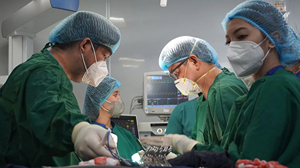Introduction
As we stride into a new era marked by rapid technological advancements, the healthcare sector finds itself at a pivotal crossroads. The question on everyone’s mind is how to merge groundbreaking technology with the essential human touch that defines quality care. In this comprehensive exploration, we'll delve into The Future of Healthcare: Balancing Technology with Human Touch, evaluating the intersection of innovation and empathy in medical environments.
Why is Balance Important in Healthcare?
Balancing technology and human interaction is crucial for several reasons. First, while technology can enhance efficiency, decrease costs, and improve outcomes, it is vital that these innovations do not replace the compassionate care that patients need. After all, healthcare is not just about treating diseases; it’s about healing individuals—mind, body, and spirit.
The Role of Technology in Modern Healthcare
Telemedicine: A New Frontier
Telemedicine has revolutionized how healthcare providers connect with patients. With video consultations becoming commonplace, individuals can access medical advice from the comfort of their homes. This technology not only saves time but also extends services to rural areas where healthcare access can be limited.

Benefits of Telemedicine
- Accessibility: Patients in remote locations can receive timely care. Convenience: Reduces travel time and wait times. Cost-effective: Eliminates many associated costs such as transportation.
Artificial Intelligence: Enhancing Diagnosis
AI has emerged as a powerful tool in diagnostics. By analyzing data patterns more efficiently than a human ever could, AI systems are proving to be reliable allies for physicians.

How AI Supports Healthcare Providers
- Data Analysis: AI processes vast amounts of patient data to highlight trends. Predictive Analytics: Can foresee potential health issues before they arise. Decision Support Systems: Provide evidence-based recommendations for treatment.
Integrating Human Touch into Technological Advances
The Value of Empathy in Care
While machines can provide data-driven insights and perform complex calculations, they lack one crucial element—empathy. Understanding a patient’s emotional state is essential in offering holistic care.
Techniques for Maintaining Empathy
Active Listening: Acknowledging patient concerns enhances trust. Personalized Communication: Tailoring interactions based on individual needs fosters connection. Physical Presence: Sometimes being there physically matters more than any digital interface.Training Healthcare Professionals for Tech Integration
To effectively balance technological tools with human interaction, training programs must evolve accordingly.
Essential Skills for Future Healthcare Workers
- Technical Proficiency: Understanding how to use new technologies efficiently. Interpersonal Skills: Developing communication skills that resonate with patients. Emotional Intelligence: Cultivating the ability to sense others' feelings and respond appropriately.
Patient-Centric Approaches in Health Tech
Empowering Patients Through Wearable Devices
Wearable technology allows patients to monitor their health in real-time. From heart rate monitors to glucose sensors, these devices empower individuals to take charge of their health journey.

Key Advantages of Wearables
- Real-Time Data Tracking: Immediate feedback on health metrics. Self-management Tools: Encourages proactive health management. Increased Engagement: Patients are more involved when they have data at their fingertips.
Personalized Medicine and Genetic Testing
Advancements in genetic testing are paving the way for personalized medicine—treatments tailored specifically to an individual’s genetic makeup.
Benefits of Personalized Medicine
- Targeted Treatments: Higher efficacy rates compared to traditional methods. Reduced Side Effects: Treatments designed for individual profiles minimize adverse reactions.
Telehealth vs In-Person Visits
Understanding Patient Preferences
Despite the growing popularity of telehealth services, many patients still prefer face-to-face interactions. Why? It boils down to comfort levels and established relationships with healthcare providers.
Factors Influencing Preference
Trustworthiness perception Need for hands-on examinations Emotional comfort during consultationsFinding a Middle Ground
Healthcare providers must offer a blend of both telehealth options and traditional visits depending on patient needs and preferences.
Challenges Faced When Merging Tech with Care
Data Privacy Concerns
As healthcare becomes increasingly digitized, ensuring that patient data remains secure is paramount. Cybersecurity threats pose significant risks if appropriate measures aren’t taken.
Strategies to Enhance Data Security
- Regular audits Encryption principles Secure access protocols
Resistance from Healthcare Professionals
Some healthcare workers may resist adopting new technologies fearing it would undermine their roles or lead to impersonal interactions.
Overcoming Resistance
Provide comprehensive training sessions. Highlight examples where tech enhances rather than replaces jobs. Foster open discussions about concerns regarding technology integration.Future Innovations Shaping Healthcare
Virtual Reality in Therapy
Virtual reality (VR) isn't just for gaming; it's making waves in therapeutic settings too! Used effectively within mental health treatments or physical rehabilitation programs, VR offers immersive experiences that promote healing through engagement.
Applications of VR in Therapy
Exposure therapy for phobias Pain management techniques Physical rehabilitation exercisesBlockchain Technology for Health Records
Blockchain presents an innovative solution for maintaining patient records securely while allowing easy access across different platforms when needed by authorized professionals.
Benefits of Blockchain Implementation
- Enhanced security measures Improved interoperability Greater control over personal health information
FAQ Section
What does "human touch" mean in healthcare?
Human touch refers to the empathetic connections made between healthcare professionals and patients during interactions—it’s more than physical contact; it embodies understanding and compassion throughout treatment processes.
How will AI change doctors' roles?
AI will serve as an assistant rather than replacement; doctors will leverage AI tools for enhanced decision-making while maintaining patient interaction as central components of their roles.
Are wearable devices effective?
Yes! Wearable devices provide real-time data empowering users toward healthier lifestyles while facilitating better communication with healthcare providers about ongoing conditions or progress post-treatment strategies.
What's the most significant risk associated with telemedicine?
One major concern relates directly back to continuity—if follow-ups aren’t managed correctly due diligence could slip leading potentially harmful delays between appointments either virtually or physically!
Can virtual reality help with anxiety disorders?
Absolutely! Studies indicate VR exposure therapy significantly reduces symptoms related fear-induced scenarios allowing individuals facing anxieties space practice coping mechanisms without overwhelming them outright!
Will technology completely replace human doctors?
Not likely! Technology enhances capabilities but cannot replicate genuine connections formed between physicians & patients—balancing both elements remains critical moving forward!
Conclusion
As we look toward https://canvas.instructure.com/eportfolios/3503436/nursing-errors-truths-discussion-guide/the-impact-of-medical-malpractice-on-healthcare-providers The Future of Healthcare, balancing technology with the cherished human touch becomes more vital than ever before! While technological innovations promise tremendous benefits—from improving efficiency through AI algorithms or expanding reach via telemedicine—the essence lies within our ability nurture relationships alongside advancements keeping compassion at forefront every step way! As we embrace this evolving landscape let us strive ensure no matter what forms care takes moving forward one thing remains unchanged—the importance understanding each other truly matters!
This article aims to provide readers not only insight into current trends but also hope regarding future developments blending necessary elements together harmoniously creating modern-day experiences reflecting core values foundational medicine itself represents—caring deeply connecting lives transforming journeys wellness!